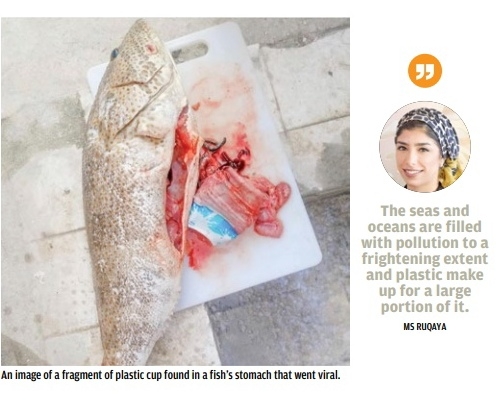Alert call after plastic fragment found in fish stomach
Experts have warned over the dangers of plastics adversely affecting the marine life as well as entering the food chain after an image of plastic fragments discovered from a fish’s stomach went viral on social media network. In October last year, a global study revealed plastic had been detected in the faeces of people across Europe, Latin America and Asia with researchers claiming to show for the first time the widespread presence of plastics in the human food chain.
Speaking to Bahrain, Ruqaya Hashem, Co-Founder of Cleanup Bahrain, said: “The source of the picture that was circulated in Bahrain is still unclear but this photo was taken by a citizen after purchasing the Grouper fish from the local market. “It is time to highlight the reasons why we have carried out clean-up campaigns on a regular basis, especially coasts and public places. The focus is on the dangers of plastics that fly daily from place to place and eventually plastic reaches our sea. The intensive use of these materials destroys marine resources and ultimately affects our health. “The seas and oceans are filled with pollution to a frightening extent and plastic make up for a large portion of it.
Cleaning up what has ended up in our environment seems like an impossible mission to complete due to the severe damage that has been done. “We need to shift our actions to immediately protecting it from waste dumping and pollution. We need to further educate people about the importance of recycling and embed it within our younger generations. Stricter regulations need to be in place for any environmental violations.” “We were unable to establish a reliable connection between nutritional behaviour and exposure to micro-plastics,” lead author Philipp Schwabl, a researcher at the Medical University of Vienna, was quoted by a newspaper.
In earlier studies on animals, the highest concentrations of micro-plastics were found in the stomach and intestines, but smaller amounts have also been detected in blood, lymph and the liver. “There are initial indications that micro-plastics can damage the gastrointestinal tract by promoting inflammatory reactions or absorbing harmful substances,” Schwabl said. “Further studies are needed to assess the potential dangers of micro-plastics for humans.” Micro-plastics have been found in tap water, bottled water, fish and mussel tissue, and even in beer,” he added. “It is therefore inevitable that at least some of these things will get into our lungs and digestive system.”
Related Posts

